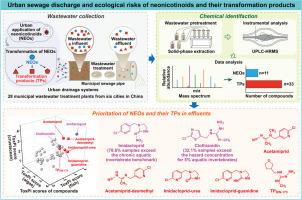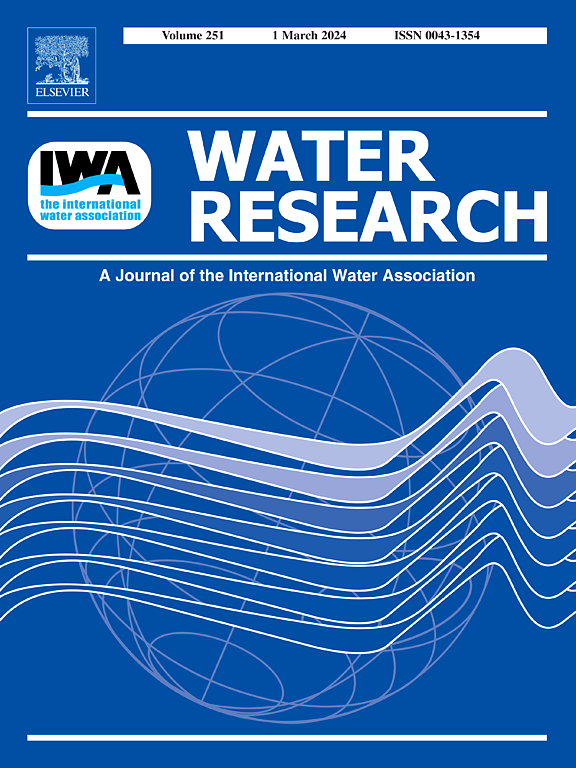新烟碱及其转化产物的城市污水排放对水生生物构成威胁
IF 11.4
1区 环境科学与生态学
Q1 ENGINEERING, ENVIRONMENTAL
引用次数: 0
摘要
新烟碱类杀虫剂(NEOs)经常被用于城市景观管理和病媒控制,并经过各种转化过程 ...本文章由计算机程序翻译,如有差异,请以英文原文为准。

Urban sewage discharge of neonicotinoids and their transformation products threatens aquatic organisms
Neonicotinoid insecticides (NEOs) are frequently used for urban landscape management and vector control, and undergo various transformation processes when release into urban environments. The discharges of NEOs and their transformation products (TPs) from urban sewer networks may pose serious threats to freshwater ecosystem integrity. However, TPs of NEOs present in municipal wastewater treatment plants (MWWTPs) and their associated risks to aquatic organisms are largely unknown. Here, we investigate NEOs and their TPs in 28 MWWTPs of six Chinese cities. Eleven NEOs and 33 TPs were identified, and 17 TPs were firstly detected in environmental medium. Considerable concentrations of NEOs and their TPs (17.0–1543 ng/L) were measured in the effluents, and two NEOs exceeded the ecological quality reference values in 32.1 % (for clothianidin) and 78.6 % (for imidacloprid) of the effluents. Simultaneously, 12 TPs had a higher regulatory priority than the corresponding NEOs in at least one aquatic organism using a toxicological priority index. Furthermore, 79.5 % of NEOs and their TPs exhibited high persistence and mobility, and thus these compounds could readily spread over long distances in aquatic environment. This study highlights that the input of NEOs and their TPs from treated wastewater into aquatic ecosystem should be regulated to mitigate the ecological risks.
求助全文
通过发布文献求助,成功后即可免费获取论文全文。
去求助
来源期刊

Water Research
环境科学-工程:环境
CiteScore
20.80
自引率
9.40%
发文量
1307
审稿时长
38 days
期刊介绍:
Water Research, along with its open access companion journal Water Research X, serves as a platform for publishing original research papers covering various aspects of the science and technology related to the anthropogenic water cycle, water quality, and its management worldwide. The audience targeted by the journal comprises biologists, chemical engineers, chemists, civil engineers, environmental engineers, limnologists, and microbiologists. The scope of the journal include:
•Treatment processes for water and wastewaters (municipal, agricultural, industrial, and on-site treatment), including resource recovery and residuals management;
•Urban hydrology including sewer systems, stormwater management, and green infrastructure;
•Drinking water treatment and distribution;
•Potable and non-potable water reuse;
•Sanitation, public health, and risk assessment;
•Anaerobic digestion, solid and hazardous waste management, including source characterization and the effects and control of leachates and gaseous emissions;
•Contaminants (chemical, microbial, anthropogenic particles such as nanoparticles or microplastics) and related water quality sensing, monitoring, fate, and assessment;
•Anthropogenic impacts on inland, tidal, coastal and urban waters, focusing on surface and ground waters, and point and non-point sources of pollution;
•Environmental restoration, linked to surface water, groundwater and groundwater remediation;
•Analysis of the interfaces between sediments and water, and between water and atmosphere, focusing specifically on anthropogenic impacts;
•Mathematical modelling, systems analysis, machine learning, and beneficial use of big data related to the anthropogenic water cycle;
•Socio-economic, policy, and regulations studies.
 求助内容:
求助内容: 应助结果提醒方式:
应助结果提醒方式:


